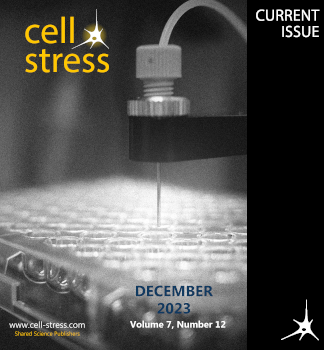COX4-1促进线粒体超复合体组装并限制耐辐射GBM中反应性氧化物的产生
IF 3
Q2 CELL BIOLOGY
引用次数: 4
摘要
胶质母细胞瘤(GBM)是一种致命的疾病,复发往往与放射性耐药性有关。尽管治疗新诊断的GBM通常有效,但越来越多的证据表明,放疗诱导的肿瘤代谢改变会促进GBM的复发和侵袭性。使用等基因放射敏感性和放射抗性GBM细胞系和患者来源的异种系,我们发现获得性放射抗性与从糖酵解代谢向更氧化的代谢的转变有关,其特征是线粒体呼吸链复合物细胞色素c氧化酶(CcO)的活性显著增加。这种CcO活性的升高与CcO调节亚基COX4的亚型表达从COX4-2转变为COX4-1、含有CcO的线粒体超复合物(SC)的组装以及超氧化物(O2•-)产生的减少有关。COX4-1在放射敏感性细胞中的过度表达足以促进糖酵解向氧化代谢的转变,并促进CcO掺入SC,同时减少O2•-的产生。相反,正常抗辐射细胞中COX4-1表达的沉默降低了CcO活性,促进了线粒体SCs的分解,并增加了O2•-的产生。此外,COX4-1表达的增加或缺失分别足以诱导放射抗性或放射敏感性表型。我们的结果表明,COX4-1促进GBM细胞中SC的组装,SC的组装可能反过来调节活性氧的产生,从而调节GBM中抗辐射性的获得。本文章由计算机程序翻译,如有差异,请以英文原文为准。
COX4-1 promotes mitochondrial supercomplex assembly and limits reactive oxide species production in radioresistant GBM
Glioblastoma (GBM) is a fatal disease with recurrences often associated with radioresistance. Although often effective at treating newly diagnosed GBM, increasing evidence suggests that radiotherapy-induced alterations in tumor metabolism promote GBM recurrence and aggressiveness. Using isogenic radiosensitive and radioresistant GBM cell lines and patient-derived xenolines, we found that acquired radioresistance is associated with a shift from a glycolytic metabolism to a more oxidative metabolism marked by a substantial increase in the activity of the mitochondrial respiratory chain complex cytochrome c oxidase (CcO). This elevated CcO activity was associated with a switch in the isoform expression of the CcO regulatory subunit COX4, from COX4-2 to COX4-1, assembly of CcO-containing mitochondrial supercomplexes (SCs), and reduced superoxide (O2•-) production. Overexpression of COX4-1 in the radiosensitive cells was sufficient to promote the switch from glycolytic to oxidative metabolism and the incorporation of CcO into SCs, with a concomitant reduction in O2•- production. Conversely, silencing of COX4-1 expression in normally radioresistant cells reduced CcO activity, promoted the disassembly of mitochondrial SCs, and increased O2•- production. Additionally, gain or loss of COX4-1 expression was sufficient to induce the radioresistant or radiosensitive phenotype, respectively. Our results demonstrate that COX4-1 promotes SC assembly in GBM cells, and SC assembly may in turn regulate the production of reactive oxygen species and thus the acquisition of radioresistance in GBM.
求助全文
通过发布文献求助,成功后即可免费获取论文全文。
去求助
来源期刊

Cell Stress
Biochemistry, Genetics and Molecular Biology-Biochemistry, Genetics and Molecular Biology (miscellaneous)
CiteScore
13.50
自引率
0.00%
发文量
21
审稿时长
15 weeks
期刊介绍:
Cell Stress is an open-access, peer-reviewed journal that is dedicated to publishing highly relevant research in the field of cellular pathology. The journal focuses on advancing our understanding of the molecular, mechanistic, phenotypic, and other critical aspects that underpin cellular dysfunction and disease. It specifically aims to foster cell biology research that is applicable to a range of significant human diseases, including neurodegenerative disorders, myopathies, mitochondriopathies, infectious diseases, cancer, and pathological aging.
The scope of Cell Stress is broad, welcoming submissions that represent a spectrum of research from fundamental to translational and clinical studies. The journal is a valuable resource for scientists, educators, and policymakers worldwide, as well as for any individual with an interest in cellular pathology. It serves as a platform for the dissemination of research findings that are instrumental in the investigation, classification, diagnosis, and therapeutic management of major diseases. By being open-access, Cell Stress ensures that its content is freely available to a global audience, thereby promoting international scientific collaboration and accelerating the exchange of knowledge within the research community.
 求助内容:
求助内容: 应助结果提醒方式:
应助结果提醒方式:


